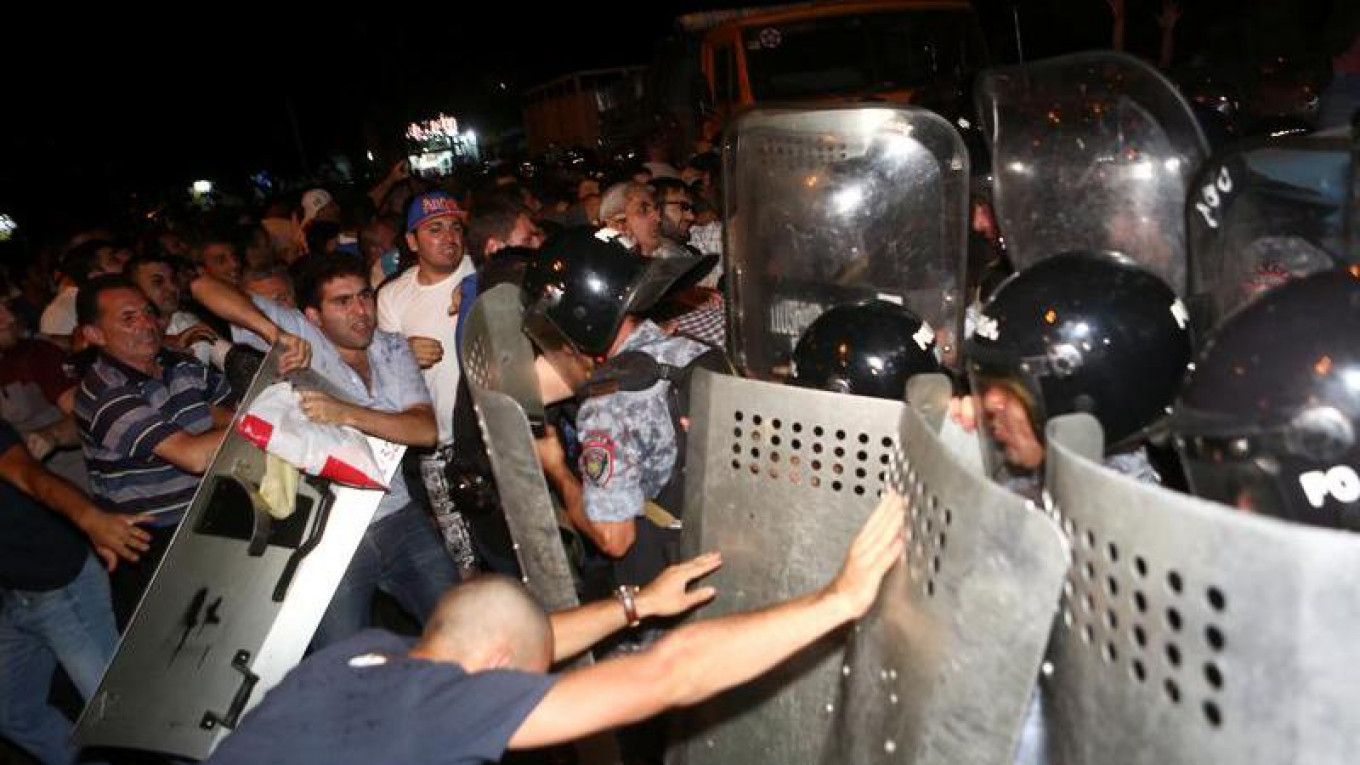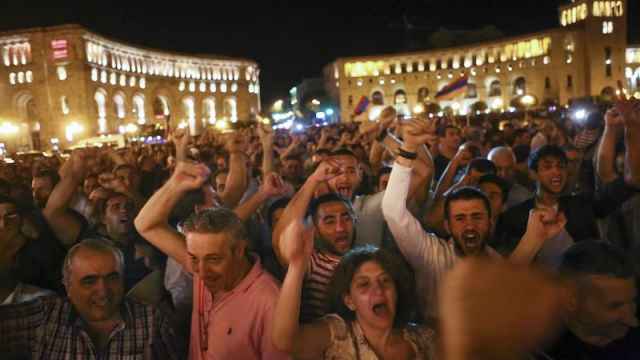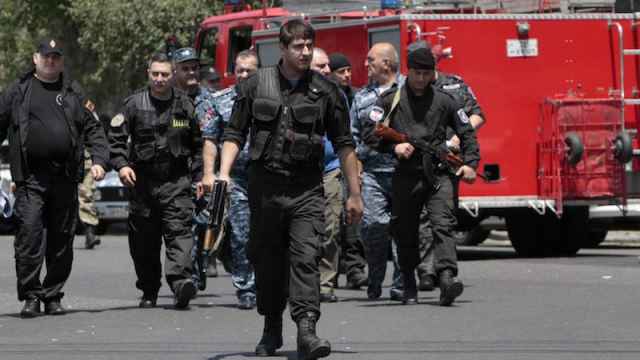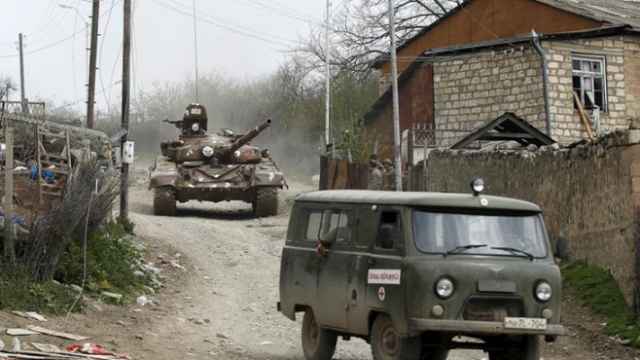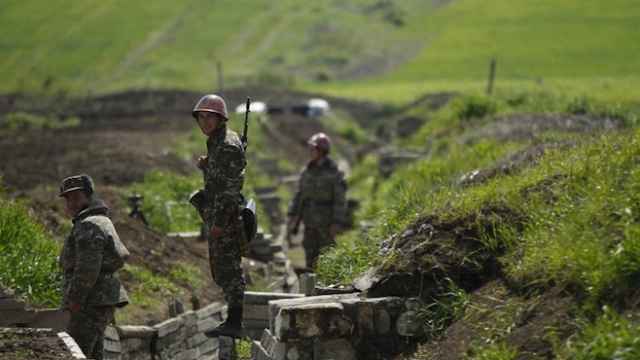On July 31, the armed militant group that seized a police station in Armenia's capital, Yerevan, surrendered to police. Members of the “Daredevils of Sassoun” group issued a statement saying they had achieved their goal of “igniting a spark,” and that they wanted to avoid any further bloodshed.
During the 15-day standoff, two policemen were killed, several of the militants received gunshot wounds, and more than 100 protesters were injured in clashes with police. With each passing day, the police employed increasingly drastic measures against the demonstrators who rallied in support of the Daredevils and their demand that Armenian President Serzh Sargsyan step down. Police brutality reached its peak with a full-scale crackdown on protestors on the evening of July 29.
According to a Human Rights Watch report issued on Aug. 2, police “used excessive force against peaceful protesters and assaulted journalists reporting on the demonstrations.”
Marut Vanyan, a cameraman from the Lragir.am news service, was beaten by two unknown men who took his video camera. Vanyan showed them his press card, but to no avail: when he covered his head with his arms, they beat his stomach and legs. The police also threw stun grenades that injured people as they attempted to run to safety, and at least one of which landed in an apartment building. Yerevan hospitals treated more than 70 wounded that night.
Twelve journalists received burns and shrapnel wounds and some had their cameras and microphones confiscated by the police. Sayat Artyunyan, a 17-year-old who happened to be walking past the fray when in Yerevan visiting relatives, lost an eye to a grenade fragment.
The events served to illustrate the growing gap between Yerevan locals who supported the Daredevils, and the millions-strong Armenian diaspora around the world.
Throughout the 20th century, the Armenian nation has come to identify itself as a collective consisting of two halves: the residents of Armenia and Nagorno-Karabakh on one hand, and the diaspora — what Armenians call the “Spyurq,” or “scattering” — on the other. The longer émigré Armenians live abroad, the more out of touch they become with the mindset of Armenians living in their homeland.
Perhaps the most vivid example of this comes from Georgi Derluguian, a New York University professor in Abu Dhabi. Derluguian endorses Sargsyan and refers to the Daredevils — distinguished veterans of the Karabakh wars — as low-life commoners, mediocrity-bound bullies who couldn’t make it in civilian life.
But by casting the seizure of the police station as a revolt by the common rabble, Derluguian overlooks the role of men such as Ara Alexander Yenikomshian: a graying and blind man with only one hand, who volunteered to negotiate on behalf of the Daredevils.
The son of a prominent Lebanese physician and a graduate of the American University in Beirut, Yenikomshian first met Monte Melkonian — who would later become the leading “fedayi” of the Karabakh wars — in Beirut in 1979. In Armenian, Arabic, and Farsi, the word “fedayi” refers to “a person who is willing to sacrifice himself for an idea.”
The term was applied to Palestinian fighters in the Arab-Israeli War of 1947-1949, the Egyptian militia that fought against the British occupation, militants of the Kurdistan Workers’ Party, and members of Armenian self-defense units in the late 19th century and the Karabakh War of 1992-1994.
In the civil war-ridden Beirut of the late 1970s, Yenikomshian and Melkonian were among the first members of the ASALA paramilitary organization, a group which carried out a series of attacks against Turkish embassies across Europe in order to force Turkey to recognize the Armenian Genocide, pay reparations, and return occupied territories.
These men lamented the fact that the previous generation of the Armenian diaspora focused more on their bank accounts than on seeking historical justice. The ASALA militants trained alongside Palestinian and Kurdish rebels in a common camp, where all were known as “fedayi.” Western media, depending on their political orientation, referred to them as either “freedom fighters” or “terrorists.”
Something went wrong while the men were preparing a bomb for an attack on the Turkish Embassy in Geneva 1980, and the resulting explosion deprived Yenikomshian of his sight and part of his left arm. He nevertheless remained an active ASALA member for some time, as well as a close friend of Melkonian.
It was Melkonian who developed the tactics for seizing the Turkish Embassy in Paris in 1981 and who trained the attackers. Four other ASALA members took 56 hostages in that operation and demanded that Turkey release its Armenian, Turkish, and Kurdish political prisoners. The men surrendered to French police 15 hours later, but not before securing the release of the cleric Manvel Yerkatyan, Turkey’s main Armenian political prisoner.
Melkonian died in Karabakh in 1993. Yenikomshian moved to Yerevan in 1996, the same year Melkonian was posthumously named a National Hero of Armenia, the country’s highest honor.
As a close friend and colleague of Melkonian, Yenikomshian must have known all the details of the preparation and capture of the Turkish Embassy in Paris. It is even possible that it was Yenikomshian who suggested those tactics to the Daredevils — who are all former Soviet citizens without any prior experience of carrying out such operations.
On Aug. 1, the day after the Daredevils surrendered, Sargsyan promised to implement radical reforms. He stressed that “Yerevan is not Beirut or Aleppo,” meaning that he condemned the use of violence to achieve political goals.
Yet when post-Soviet regimes rife with corruption and the mere trappings of democracy essentially tell their citizens to either emigrate or put up with injustice and repression, society inevitably becomes more radicalized. And when leaders create a political system that they manipulate as if by remote control, they effectively invite “fedayi” to make a stand.
A Message from The Moscow Times:
Dear readers,
We are facing unprecedented challenges. Russia's Prosecutor General's Office has designated The Moscow Times as an "undesirable" organization, criminalizing our work and putting our staff at risk of prosecution. This follows our earlier unjust labeling as a "foreign agent."
These actions are direct attempts to silence independent journalism in Russia. The authorities claim our work "discredits the decisions of the Russian leadership." We see things differently: we strive to provide accurate, unbiased reporting on Russia.
We, the journalists of The Moscow Times, refuse to be silenced. But to continue our work, we need your help.
Your support, no matter how small, makes a world of difference. If you can, please support us monthly starting from just $2. It's quick to set up, and every contribution makes a significant impact.
By supporting The Moscow Times, you're defending open, independent journalism in the face of repression. Thank you for standing with us.
Remind me later.



